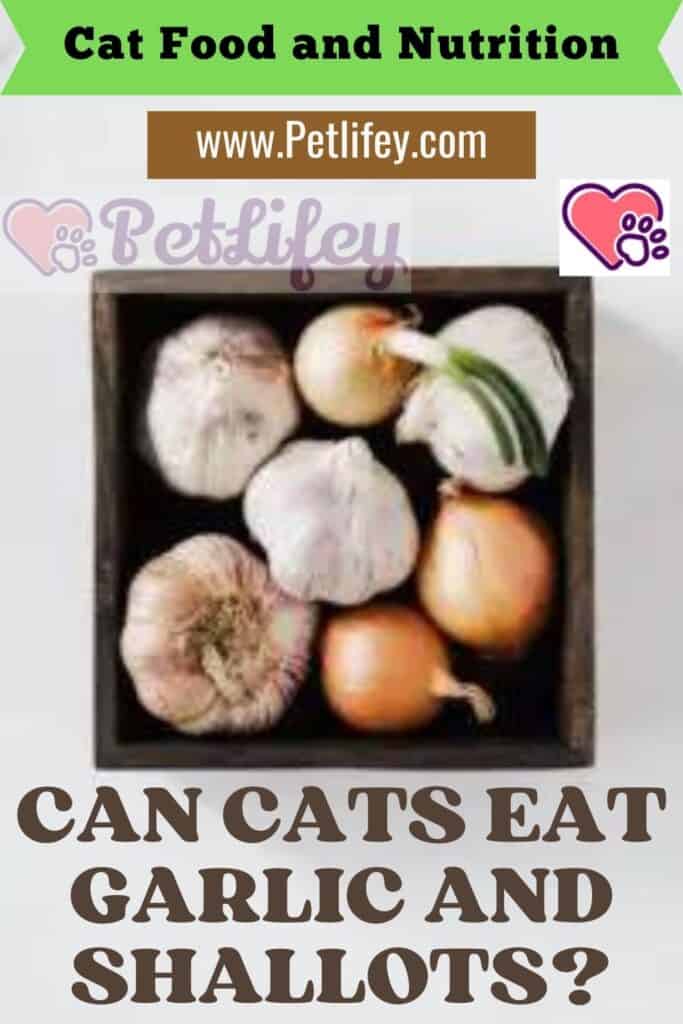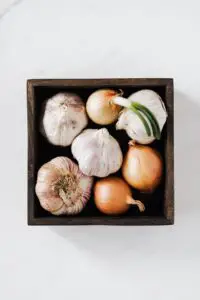
Some human foods are also great for pets, but not all. Can the cat eat garlic and shallots or are they bad for him?
You know, cats (like other pets) can be very curious to taste the food of us humans. And if sometimes it can be a crime without consequences, when the cat steals human food that is not suitable for it, it could be sick. Also very bad. Can the cat eat garlic (and the like)? There are risks to the health of the cat, which must be considered, and medical problems that should be promptly reported to our veterinarian if they occur. Let’s find out more together.
Can cats eat garlic and shallots?
Cats are notoriously picky but sometimes – and let’s say the various YouTube videos are great evidence – they develop a taste for human food, such as spaghetti or omelette. Cute, sure, but dangerous. Common ingredients like garlic and scallions are poisonous to cats.
We must always empty the workbench and keep the pantry tightly closed to protect your furry companions. Garlic and scallions may taste great to us, but they are toxic to cats. So we must be careful and never leave these foods “within reach of the cat”.
Our cat may be attracted to the pungent smell of garlic and scallions, but we must never let them taste these foods. Garlic, shallots, onions, leeks, chives – all members of the genus Allium – are poisonous to cats. Your cat may get sick from eating a large amount at one time, or even eating little but for a long time.
Foods like garlic and scallions destroy red blood cells and cause anemia. The cat may not even get sick for a few days after eating it. He might just look weak and tired, but we should look for other symptoms of poisoning and anemia. Possible: orange to red urine, vomiting, diarrhea, pale gums, elevated heart rate, loss of appetite and dehydration.
But in any case, if the cat can eat garlic or similar foods, it probably will. If we notice that he did, we don’t have to wait for symptoms to develop. We immediately call a vet or pet poison control line.
A very dangerous food
Most cats are not attracted to the smell of raw garlic, scallions, and similar members of the onion family. Once sauteed, roasted or included in a baking dish, however, they become more tempting. You may also need to keep your cat away while cooking or eating.
Concentrated forms of Allium – probably in the kitchen we can have garlic and / or onion powder – carry greater risks of poisoning. They must be stored safely. Onion powder is also a common baby food additive (baby food, for example), which some pet owners use for sick or sensitive cats, unaware of their negative effects. To be avoided absolutely.
We always check all ingredients listed in cat food products. Although the levels of Allium found in commercial cat foods are approved by regulations and are unlikely to cause acute health problems, long-term toxicity is possible.
In the kitchen with the cat
It is best to avoid feeding your cat human food altogether. We clean the kitchen while we cook, to avoid extra work after meals. Remember to store all potentially toxic foods and ingredients in cat-proof containers (well, nothing really is cat-proof, but let’s make an effort and stop trying to teach our cat to open the refrigerator). Let’s try to feed cats before meals, to avoid having pets at the table.
And if theoretically the cat can eat garlic in smaller quantities without problems, there is no definitive information on the quantity that can be fine, in complete safety. Current regulations for garlic in food supplements are likely to suit most animals. In the absence of further studies, it is best to avoid giving our cat food and dangerous substances, even if not poisonous, altogether.
What is garlic poisoning?
The chemicals in garlic enter the cat’s bloodstream and start breaking down red blood cells, which will quickly lead to hemolytic anemia, a very dangerous condition. Some of the symptoms we may observe include vomiting, difficulty breathing, diarrhea, and pale gums.
The longer we wait for medical assistance, the more serious the cat’s condition becomes. If we notice any of the garlic poisoning symptoms, take your cat to a vet as soon as possible to prevent life-threatening complications. Some cat owners give their pets garlic because it is believed to have medicinal benefits, including the prevention of heart disease and fleas. However, as we have already mentioned garlic is toxic to cats, so it should never be included in their diet, under any circumstances.
Symptoms and Causes of Garlic Poisoning in Cats
Symptoms of garlic poisoning may not appear immediately. In fact, it often takes two to four days after consumption for symptoms to appear, which can make diagnosing this condition very difficult for cat owners and veterinarians. Some of the symptoms that can be observed include:
- He retched
- Diarrhea
- Fatigue
- Breathing difficulty
- Increased respiratory rate
- Increased heart rate
- White gums
- Collapse
Garlic poisoning is caused – as it’s easy to guess – by exposure to garlic. The amount of garlic needed to poison the cat varies depending on the cat’s weight, health and breed type. In most cases, the cat can eat garlic even in the quantity of a single clove, to be poisoned. After you consume the garlic, it begins to damage the red blood cells, which makes them more likely to burst, eventually leading to hemolytic anemia.
Garlic Poisoning Diagnosis
If you notice any of the garlic poisoning symptoms, you should immediately take your cat to a veterinarian for treatment. We describe the symptoms we observed, when they started and any changes to our cat’s diet. The vet will begin by performing a series of tests , including a complete blood count, urinalysis, and blood chemistry profile. The results of these tests will help the vet determine if the cat is suffering from low red blood cell levels. The vet should be able to locate Heinz’s bodies, which occur when the cat is suffering from hemolytic anemia, in a blood sample.
However, there are a number of causes of hemolytic anemia, so your vet cannot determine if your kitty has garlic poisoning from the presence of Heinz’s bodies alone. In many cases, the diagnosis is made based on the presence of Heinz bodies and information provided by the cat’s owner. That is why it is so important to be as detailed as possible when talking to the vet about our four-legged friend’s condition.
Treatment of garlic poisoning in cats

Treatment varies based on when the cat consumed the garlic. If the garlic has recently been consumed, the vet will begin inducing vomiting by giving orally a 3% hydrogen peroxide solution. This will remove any garlic from your pet’s stomach that hasn’t been digested and will prevent the cat’s condition from worsening.
A gastric lavage, which is the medical term for stomach washing, can also be performed to ensure that all toxins have been flushed out of the stomach. Your vet may also need to administer activated charcoal. Activated charcoal absorbs toxins so they don’t have a chance to enter the cat’s bloodstream and cause further damage. The vet will need to monitor the cat’s condition to determine if he needs supportive care such as intravenous fluids or oxygen therapy.
It is common for cats with garlic poisoning to need intravenous fluids to prevent dehydration due to the vomiting and diarrhea this condition causes. If we have used a garlic spray or homeopathic product on the cat’s skin, the vet will need to wash it thoroughly to remove any lingering toxins. Although rare, if your cat’s condition is severe and she has already lost a lot of red blood cells, she may need a full blood transfusion to survive.
In mild to moderate cases of garlic poisoning, recovery rates are high, however cats with severe cases of garlic poisoning can suffer from complications. The vet may hold the cat after treatment to make sure his condition is stable before releasing him. Once it’s been released, we ask the vet for any home care while the cat heals.
First, it’s important to remove any form of garlic from your cat’s diet and stick to veterinarian-approved cat foods. We check all products we use, including any homeopathic flea or skin treatments, to make sure no garlic or Allium family foods are included. If we use garlic while cooking, make sure to keep it in an area where cats cannot reach it.






